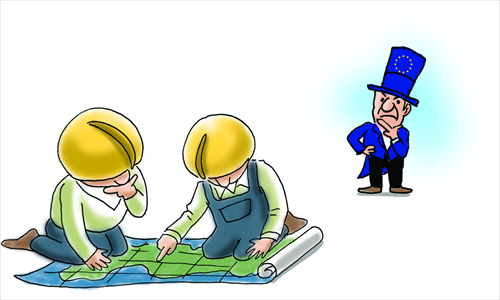China can calm EU worries about Belt, Road

Illustration: Liu Rui/GT
The role of China in Europe is an issue of high interest for Western universities, research centers and media. But what has recently attracted their attention is the "One Belt, One Road" initiative that informs the new economic policy of Beijing.
According to a study conducted by London's advisory group Grisons Peak, for example, the majority of China's loans invested overseas are closely linked to this initiative.
Although the initiative is well known in China, this is not the case in Europe. In particular, some experts tend to have a good knowledge of Asian affairs and attempt to expand their research on the matter, but public opinion remains unfamiliar with the term.
For most European scholars dealing with it on the whole, China is now attempting to complement its previous investments by following a more proactive policy in the Old Continent. The revival of the ancient Silk Road provides, they say, an opportunity for the country to do so.
As opposed to the principal interpretation of the "One Belt, One Road" initiative in China, the discussion in Europe is not just limited to business and economics and the logic of win-win cooperation. The policy of Chinese enterprises is perceived to be driven by Beijing's will to promote special Chinese characteristics in another part of the world. A Forbes article, for example, recently focused on the high concern of Europe because of the lack of values it shares with China.
Specifically, Brussels finds it problematic that Beijing is attempting to forge ties with Central and Eastern European countries and also Greece in the context of the ongoing economic crisis. It believes that Beijing is benefiting by its unquestionable liquidity and is offering terms and conditions that might serve its interests but that do not necessarily match European standards. Examples include low cost investments, the exclusion of European companies from business deals and a lack of rights for workers.
The European arguments also have some flaws.
Every reference to EU standards and values may fit with the common understanding of China in Europe, but fails to provide an analysis of the other side's thinking.
From the moment Europe is lacking liquidity and China is able to provide it via a new wave of investments in the context of the "One Belt, One Road," it is natural for the latter to ask for some of its own terms to be applied.
Additionally, the EU encourages China's contribution to the "Juncker's Investment Plan." This means that the relatively active role the country undertakes in Europe also derives from its positive response to official invitations it receives. China will not be a deus ex machina to save the European economy or single national economies of the EU. It invests in states welcoming its presence.
Differences in the approach of Europe and China vis-à-vis investments are not new. They are now becoming more apparent due to the implementation of the "One Belt, One Road" initiative and because of Beijing's deeper involvement in infrastructure works and maritime connections in the Eurasia region.
This said, both sides need to find a common denominator in order to smoothly cooperate.
A partnership cannot be based on serious disagreements as they will prevent future business deals or create a tendency of mutual suspicion.
On the one hand, the EU might not want to block potential Chinese investments if they could not achieve all the standards set up.
And on the other, Chinese companies might not want to do business in Europe ignoring the framework of EU law. Where there is a will, there is always a way cultivating the ground for compromises.
More importantly, the flourishing debate about the impact of the "One Belt, One Road" policy in Europe goes beyond the analytical framework offered by journalists and scholars. This is all about the possibility of a symbiosis. Lessons can only be extracted from real life and on the basis of practical experiences.
China and the EU now have a unique opportunity to discover whether they can proceed together in day-to-day business.
The author is a lecturer at the European Institute in Nice, France. opinion@globaltimes.com.cn